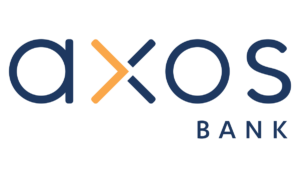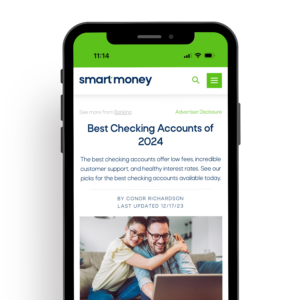Takeaways
- Banks are financial institutions that accept customers’ money and lend capital.
- Banks offer their customers accounts that let them earn interest and grow their funds.
- Banks try to borrow money at a low interest rate and lend money at a higher rate.
- Online banks have boomed in popularity as younger customers shun branch locations.
- National banks have the largest footprint, while online banks compete on specific products, like high-yielding checking and savings accounts.
Some of the links in this article are from advertising partners of Smart Money, which does not influence our evaluations or recommendations. We work to provide you with accurate and reliable information. Our opinions are our own.
What is a Bank?
A bank is a financial institution whose primary business is receiving customer deposits and making loans. Banks are the fabric of our economic ecosystem because you can store excess cash, get loans to finance purchases, and use your accounts to conduct personal or business transactions.
Not all banks offer the same suite of services or financial products. Usually, the larger the bank, the more offerings it provides customers and the more stable the financial institution. Banks offer products like checking accounts, savings accounts, mortgages, certificates of deposit, business loans, credit cards, and more.
In addition to their financial products, banks also provide services to help differentiate themselves from their competition. For example, some banks offer wealth management services, currency exchanges, and safe deposit boxes. Banks use these services to set themselves apart from the competition and do so even further by providing cashiers' checks, money orders, and wire transfers.
Over the last several decades, there has been a significant shift from traditional brick-and-mortar banks to online banks. This shift has created a boom in online banks competing on only certain aspects of the conventional banking business model. For example, some online banks pride themselves on offering the highest-yielding checking accounts or the lowest-cost mortgages.

Member FDIC
Axos Bank® Rewards Checking
Smart Money Rating: 5/5
APY: 3.30% with No Minimum Balance
Bonus Offer: Up to $300 Bonus (Terms Apply)
How a Bank Works
Almost all banks have the same business model. A bank is a business that makes money by sourcing capital from customer deposits, checking and savings, and lending those funds to other customers.
Here’s how it works: The bank pools the capital from customers' deposits, then lends those funds out to customers through loans and charges interest. The bank makes interest income and pays its customers interest on their deposits. A bank profits by lending out money at a higher interest rate than it costs to hold its customers' deposits and attract new funds.
All banks in the U.S. must obtain a bank charter before conducting business or accepting deposits from customers [1]. The U.S. has a dual banking system comprised of federally and state-charted banks. One or more regulatory agencies regulate most banks. The three main U.S banking regulators include:
- Federal Reserve
- Office of the Comptroller of the Currency
- Federal Deposit Insurance Corporation
Most banks are run well because the banking industry is heavily regulated, and trust in the banking system is paramount. These regulatory agencies seek to keep that trust flourishing because it is an integral part of the economy.
Banks are considered a haven to stash cash because most are backed by the Federal Deposit Insurance Corporation (FDIC). The FDIC insures deposits up to $250,000 per bank. If a bank’s business model gets out of whack and becomes insolvent, your funds are protected by the FDIC, and you will get your money back. The FDIC aims to inject trust into the U.S. banking system and protect depositors.
If you need to file a complaint against your bank, you can submit a formal complaint to the Consumer Financial Protection Bureau through their online portal. Regulating banks is a full-time job because there are many kinds of banks.
Types of Banks
There are many ways to categorize banks, and the web of different types of banks can get complicated quickly. An easy way to think about banks is to simply bucket them by size and whether they have brick-and-mortar branch locations. Here are the major types of banks to know about:
- National Banks: National banks are the most prominent traditional banks and offer their services through various branches throughout the United States and sometimes internationally. As the big banks on the Street, these businesses provide the most extensive product offerings, have the most ATM locations, and give their customers access to the latest mobile apps and technology. Many savers feel safer keeping their funds with national banks.
- Regional Banks: Regional banks are one layer down the totem pole from National banks. These banks take a more targeted approach to their customers and only service specific areas of the U.S., such as the Southeast, Pacific Northwest, and the MidAtlantic. Regional banks typically have a solid footprint in their region of business.
- Community Banks: If you progress down another rung, Community Banks service a much smaller customer base. Sometimes, community banks may be confined to only one or two states or even one branch servicing a small town or city.
- Online Banks: As mentioned earlier, there has been a catalyst of online banks that only conduct business online. They generally offer the latest mobile apps and web technologies, typically appealing to younger customers. Younger customers simply don’t want to visit brank locations anymore. In a recent survey conducted by the American Bankers Association, 57% of Generation Z and 60% of Millennials use mobile banking apps, while only 4% visit branch locations [2].
Get Smart With Your Money
Fresh weekly articles delivered straight to your inbox.
Enter your name and email for free tips and tricks.

Bank Savings Accounts and Loans
Banks' core business is accepting customer deposits and lending money. They do this through a series of accounts and loans that can help grow your money and give you the capital to start a business, buy a house, or make everyday purchases.
Common Bank Accounts
Banks must attract customers by offering an array of accounts that can earn interest on customer deposits. This can be excellent for your net worth because you can take advantage of compounding interest with these accounts. Here are some accounts to consider:
- Checking Accounts are deposit accounts that hold your cash and are used for everyday purchases. Some checking accounts earn interest, but it is usually low compared to other accounts. Most debit cards link to your checking account and use cash instead of credit to make purchases. Checking accounts are used to make transfers, pay bills, and withdraw money from ATMs. Read about our picks for the best high yield checking accounts.
- Saving Accounts are also depositing accounts, but they are more interest-bearing. During times of high interest rates and inflation, savings accounts offer a more competitive annual percentage yield to attract customer deposits. Read about our picks for the best high yield savings accounts.
- Money Market Accounts are a blend of checking and savings accounts. They offer the dual benefits of higher interest and the convenience of checking accounts. With some accounts, you can link your debit card to your account and cut checks from this account. Read more about money market accounts.
- Certificate of Deposits are savings accounts with a fixed interest rate and term. These savings accounts require you to leave your cash untouched for the term, which can vary from 6 months to 60 months (or more). Because you can’t touch your funds, certificate of deposits usually offer higher APYs than savings accounts. Read about the 7 Types of Certificates of Deposits.
- Stock Brokerage Accounts are not bank accounts. Instead, these online stock brokerage accounts, offered by larger banks, hold investments like stocks, bonds, mutual funds, target date funds, and exchange-traded funds. Read about our picks for the best high online stock brokerage accounts.
Common Bank Loans
Banks profit by offering credit products with higher interest rates than their deposits. You can analyze banks with low-cost offerings and balance that with the number of products you use regularly. Here are some bank loans and credit products to consider:
- Credit Cards are payment cards issued by some banks that allow customers to use a line of credit with the bank to make purchases. You can see your credit card balances in the same online portal when you review your checking and savings accounts. Your credit card’s annual percentage rate, rewards, and other terms will be determined by your credit score and other factors like your income. Read about how to apply for a credit card.
- Auto Loans are loans from a bank to finance the purchase of a new or used car. You must pay a down payment on your vehicle with your loan. Your auto loan terms will be dictated by your debt-to-income ratio, income, and credit history. Read about how to pay off your auto loan quickly.
- Mortgages are loans to purchase a home. The biggest hurdles to buying a home are saving for a down payment and securing a mortgage. You can ask your real estate agent for recommendations on local mortgage providers. Read more about mortgages.
- Personal Loans are loans issued by a bank to fund the renovation of a house, pay medical bills, moving expenses, and more. Read more about our step-by-step guide on how to get a personal loan.
- Business Loans are loans given to start new businesses or fund the growth or expansion of an existing business. Many banks offer tailored business services to customers. Read more about how to start your own online business.
Bank Services and Features
Banks tend to differentiate themselves from heavy competition by offering unique services, offerings, and account features. Here are some standard banking services to understand and use:
- Debit Cards are payment cards linked to your checking, money market, or savings account. Instead of walking around with cash, you can use your debit card to make a purchase. Customers who don’t want to open a credit card account often use debit cards to avoid getting into credit card debt. Learn more about debit cards.
- Direct Deposits into your account are seamless at most established banks. Whether you are making a direct deposit from getting paid at work or your side hustle, banks want to facilitate money coming into their bank so they can lend it and earn interest. Read more about how direct deposits can help automate your finances.
- Money Transfers are free at almost all banks. Some national and online banks have established same-day transfers, making it super easy to move your funds around quickly and efficiently.
- Automatic Payments and Bill Pay are fun and convenient features of modern banking. You can set up automatic or recurring payments to your credit card, utility bill, or rent payment. Read more about how to curb frivolous spending.
- Free Credit Scores are provided to customers to help them get a sense of where they stand in their credit journey. Some banks provide free access to VantageScore or FICO scores and alert you of changes on your credit report. Read more about credit scores.
- ATMs give you access to your cash. Some businesses only accept cash, while others take cash, credit cards, or cryptocurrency. If you like using cash or have adopted the cash envelope budgeting system, you want to pick a bank with multiple ATM locations. Some online banks tap into national banks’ ATM networks.
- Branch Locations allow you to conduct in-person meetings and discuss products with bankers more thoroughly. With so many Generation Z and Millennials switching to online banks, the number of branch locations has become less relevant to this cohort. Read more about when you might want to talk to a financial advisor.
- Customer Support is a massive differentiator among banks with similar product offerings. Speaking to an actual representative who can answer your questions can make all the difference in the world.
Banks vs. Credit Unions
An essential distinction between banks and credit unions is that banks are for profit and credit unions are non-profit organizations that are member owned. Banks use customers’ deposits, while credit unions use their members' deposits.
A bank is in business to make money by accepting deposits at a lower cost of capital than what it lends to customers through loans, credit cards, and mortgages. A bank profits from the spread between what it costs to get money and what it charges when it lends it. This is the traditional banking model. A credit union, however, pushes this difference back to its members through dividends into their share accounts.
Want to learn more? Get Smart -> What is a Credit Union?
Is the Central Bank a Bank?
You may have heard of the U.S. central bank and wondered if that was a traditional bank. The answer is yes and no. The U.S. central bank is the Federal Reserve, which helps oversee monetary stability and sets interest rates through the federal funds rate. The Federal Reserve is considered a bank’s bank because it controls the U.S. money supply and keeps the banking system safe and healthy.
However, the Central Bank does not have ATMs, offer mortgages, or other traditional banking services. These activities are reserved for online, traditional, national, regional, and community banks.
Should You Use an Online Bank?
Online banks are top-rated among Generation Z and Millennials. That is because online banks target this customer base and offer these young customers compelling products they are interested in like high-interest savings or checking accounts.
Additionally, online banking can be tailored to your lifestyle. For example, not all online banks offer auto loans, mortgages, or boat loans. Younger bank customers don’t need these offerings because these life milestones are shifting to later in life. Instead, young professionals are choosing to optimize their current life stage.
Research online banks to see if their services match your personal needs. If all you need is a checking and savings account, an online bank could be a perfect fit. One point to keep in mind is that some online banks don’t have ATMs. Instead of offering their own ATMs, they let you access your cash through a network of ATMs by either charge you a small fee or a monthly withdrawal limit.
Want to learn more? Get Smart -> What is a Compounding Interest?
Smart Summary
Banking is an essential part of your finances. As the hub of your financial life, using a great bank will make your life easier. It can be the central node to automating your finances and offer a suite of financial products like CDs and money market accounts that can boost your net worth over time. Take the time to research what banks align with your values and long-term financial goals. Switching banks can be a headache. Taking the time to choose the best bank for you is a smart money move.
(1) Baker McKenzie. Who Regulates Banking and financial Services in Your Jurisdiction. Last Accessed April 10, 2024.
(2) American Bankers Association. National Survey: Bank Customers Use Mobile Apps More Than Any Other Channel to Manage Their Accounts. Last Accessed April 10, 2024.











